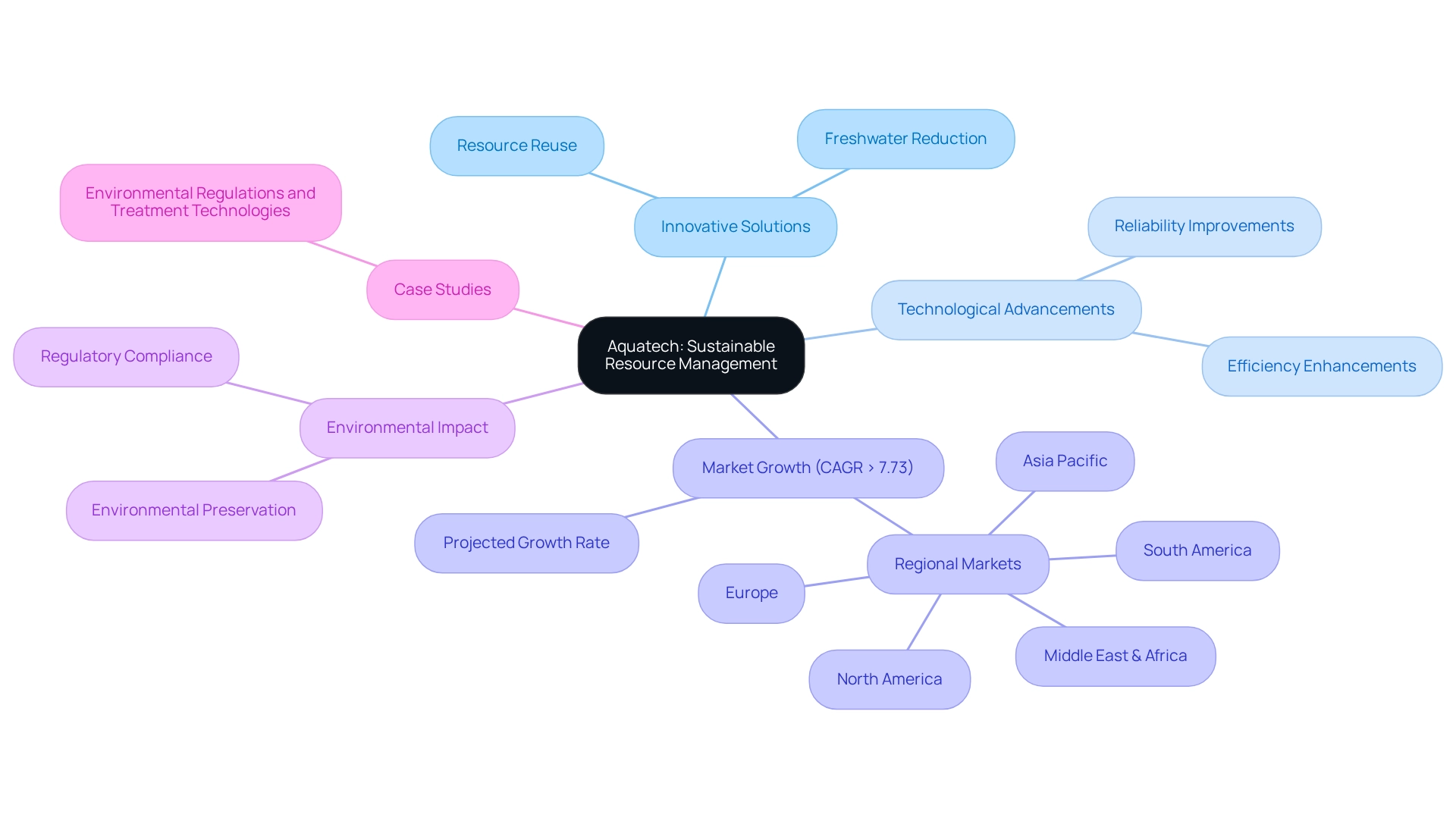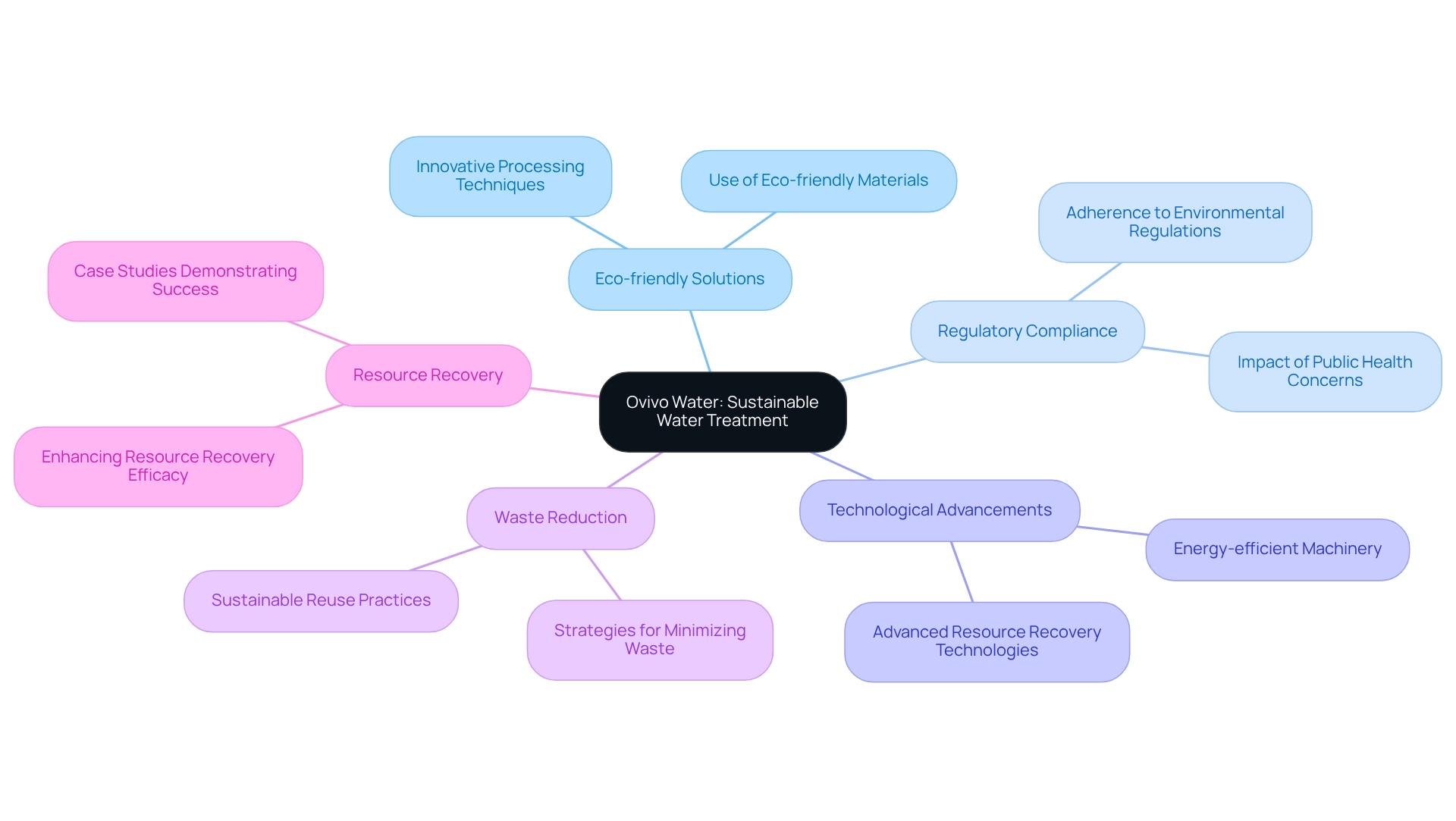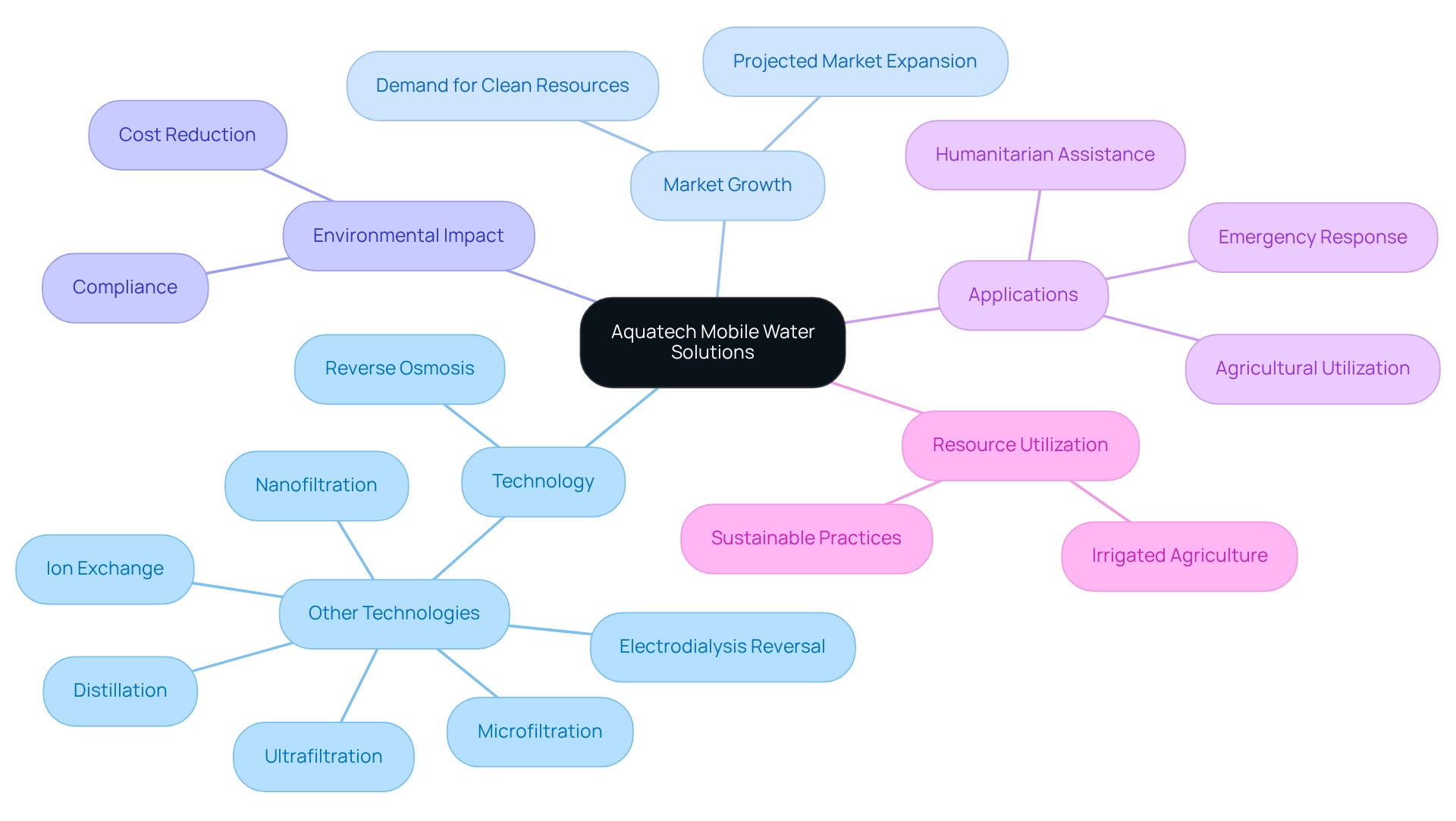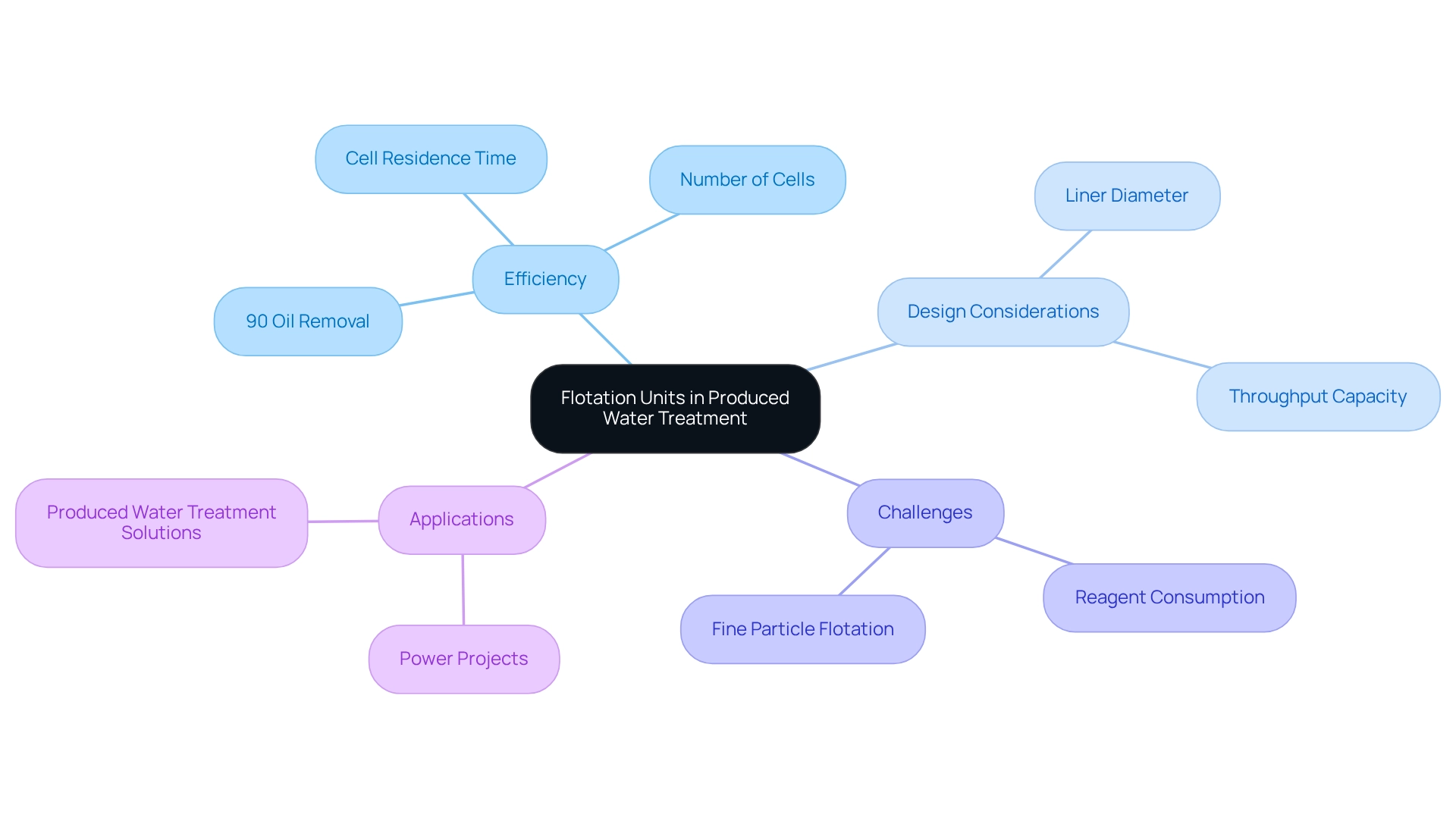Overview
The article titled "10 Produced Water Treatment Solutions for Sustainable Management" addresses the critical challenge of managing produced water in an environmentally sustainable way. It underscores the necessity of employing:
- Advanced filtration systems
- Mobile treatment technologies
- Circularity strategies
to minimize waste and foster resource reuse. Supported by compelling case studies, these solutions not only meet regulatory standards but also enhance operational efficiency, showcasing their effectiveness in tackling this pressing issue.
Introduction
In the rapidly evolving landscape of energy production, the management of produced water stands as a critical concern for companies striving for sustainability and compliance with environmental regulations. As the demand for innovative solutions grows, advanced technologies and strategies are being implemented to enhance water treatment processes, reduce freshwater consumption, and promote responsible resource management.
Industry leaders are paving the way for a future where water reuse is not just an option, but a necessity. This article explores the pivotal roles played by various companies and technologies in shaping sustainable practices within the energy sector. Effective produced water management can lead to both environmental benefits and operational efficiencies, underscoring the importance of these advancements in the industry.
Harbinger Land | Comprehensive Land Acquisition Services for Energy Projects
Harbinger Land excels in providing customized land acquisition services tailored for power projects, emphasizing site and right-of-way acquisition. The complexities of land acquisition, including legal and regulatory challenges, can be daunting. Our proficiency in negotiating and acquiring leases and easements is essential for developing the infrastructure necessary for effective produced water treatment solutions. By utilizing advanced GIS modeling services, we enable efficient easements that save clients time and money, empowering utility companies to navigate the complexities of land acquisition skillfully.
This efficiency streamlines project timelines and promotes sustainable practices in resource management, aligning with the growing emphasis on environmental responsibility in the power sector. As the landscape of power development evolves, adapting to regulatory changes and community expectations becomes paramount. Strategic land acquisition is, therefore, a cornerstone of successful project execution.
In 2025, the demand for effective land acquisition services is projected to rise, particularly as solar power is expected to constitute nearly 60% of all new utility-scale electricity-generating capacity installed in the U.S. This underscores the necessity for trusted partnerships in the industry, where Harbinger Land plays a crucial role. Our dedication to innovation and client satisfaction, combined with effective document imaging solutions for title research and leasing, positions us as a frontrunner in this essential field, ensuring that projects can advance seamlessly while addressing issues related to wastewater management.
As Robert Alan Silverstein wisely expressed, 'We can build a more sustainable, cleaner, and safer world by making smarter choices regarding power.' Furthermore, the dual benefits of renewable energy—environmental health and economic growth—highlight the importance of Harbinger Land's services within broader industry trends.
Aquatech | Advanced Produced Water Treatment for Sustainable Reuse
Aquatech stands at the forefront of generated fluid management, delivering innovative solutions that facilitate the sustainable reuse of resources across various industrial applications. Their advanced technologies are meticulously crafted to significantly reduce freshwater consumption and alleviate environmental impacts, establishing Aquatech as an indispensable player in sustainable resource management within the energy sector. The generated fluid processing market, spanning regions such as Asia Pacific, North America, Europe, the Middle East & Africa, and South America, is projected to grow at a compound annual growth rate (CAGR) surpassing 7.73% from 2025 to 2034, highlighting the urgent demand for efficient processing solutions.
Recent case studies underscore successful sustainable resource reuse initiatives that not only adhere to stringent environmental regulations but also bolster operational efficiency. As Aditi Shivarkar, an expert in the field, notes, "Technological advancements are enhancing the reliability and efficiency of generated fluid management systems, addressing both regulatory compliance and environmental preservation." By embracing cutting-edge technology for care, businesses can adeptly navigate regulatory challenges while safeguarding critical freshwater resources, emphasizing the vital role Aquatech plays in this dynamic landscape.

Gate Energy | Produced Water Polishing Solutions for Enhanced Treatment
Gate Energy stands at the forefront of refined liquid polishing solutions, revolutionizing processing methods to meet stringent quality standards for reuse. Their advanced technologies effectively eradicate residual contaminants, making treated fluid suitable for a variety of applications, including hydraulic fracturing and irrigation. In 2023, North America commanded 42.8% of the liquid management market, underscoring an increasing demand for efficient solutions like those offered by Gate Energy. As the oil and gas sector evolves, produced water treatment solutions through customized management strategies are essential to address the unique challenges posed by generated fluid. Gate Energy's innovative technologies are meticulously designed to meet these needs.
Case studies provide compelling evidence of Gate Energy's success, such as a project that achieved a remarkable 30% reduction in contaminants. This accomplishment not only demonstrates the effectiveness of their processing methods but also highlights their commitment to adhering to the industry's rigorous quality standards. Brian Moore, VP of NICCA USA, Inc., remarked, "The quality of research they have done for us has been excellent," further validating Gate Energy's approach.
Furthermore, insights from industry leaders emphasize the critical importance of enhancing fluid processing methods, such as produced water treatment solutions, to ensure sustainable management of generated liquid. As the landscape of the energy sector continues to shift, the call for innovative solutions has never been more urgent. Gate Energy is poised to lead this charge by providing the expertise and technology necessary for effective fluid management through produced water treatment solutions.
Ovivo Water | Sustainable Water Treatment Technologies for Industry
Ovivo offers a comprehensive suite of eco-friendly solutions for sustainable fluid processing, specifically tailored for industrial applications in produced water treatment solutions. Their innovative approaches prioritize waste reduction and resource recovery, which are essential for achieving sustainable reuse practices. By leveraging advanced processing techniques, Ovivo aids industries in adhering to stringent environmental regulations while fostering a sustainability culture that resonates with growing public health concerns.
The case study titled 'Market Growth Drivers for Generated Fluid Processing' illustrates how the generated fluid processing sector is driven by regulatory compliance, ecological challenges, and technological advancements, underscoring the critical role of this sector in the future of sustainable power generation. Recent case studies further demonstrate the efficacy of their technologies in enhancing resource recovery, highlighting Ovivo's pivotal contribution to this industry.
Moreover, founder Mr. Parthiv Kinariwala stresses the necessity for industries to embrace more sustainable practices, such as the adoption of eco-friendly materials and water-saving technologies, to satisfy increasing environmental regulations and consumer demands. With 792 views on the article discussing these technologies, it is clear that sustainable resource management is a pertinent and widely debated topic, further emphasizing the importance of Ovivo's contributions to the field.

Aquatech | Mobile Water Solutions for On-Site Produced Water Treatment
Aquatech's mobile solutions for liquids provide a robust and adaptable approach to managing produced water treatment solutions, empowering energy firms to tackle management challenges directly at the site. These systems are engineered for swift deployment and can be customized to meet specific project needs, ensuring efficient processing that adheres to environmental regulations.
With the mobile liquid purification market poised for substantial growth, driven by the escalating demand for clean resources, Aquatech's solutions stand out prominently. Notably, reverse osmosis technology is anticipated to lead this market due to its exceptional contaminant removal capabilities, as evidenced by numerous case studies. Successful on-site produced water treatment solutions have illustrated the efficacy of these systems, demonstrating their potential to enhance operational efficiency and sustainability.
Industry leaders recognize the growing importance of on-site liquid purification technologies, which not only bolster compliance but also reduce transportation costs and environmental impact. As Chitranshi Jaiswal noted, the increasing adoption of mobile liquid purification solutions for emergency response and humanitarian assistance underscores their broader relevance.
Furthermore, the fact that irrigated agriculture is, on average, at least twice as productive per unit of land as rain-fed agriculture emphasizes the necessity of effective resource utilization, resonating with the target audience. As the energy sector undergoes transformation, Aquatech's mobile solutions for managing liquid resources are well-positioned to play a pivotal role in sustainable management practices.

Flotation Units | Key Technology for Effective Produced Water Treatment
Flotation units are pivotal in the processing of effluent, utilizing gas bubbles to efficiently separate oil and solids from liquid. This innovative technology not only enhances process effectiveness but also ensures that the processed liquid adheres to stringent quality standards for reuse. Recent advancements in flotation technology have led to optimized designs that balance liner diameter and throughput capacity, significantly enhancing performance. Additionally, the design of hydrocyclones necessitates a careful equilibrium to maximize efficiency in the separation process.
The efficacy of flotation units is highlighted by their capability to achieve approximately 90% dispersed oil removal when meticulously designed and operated, as noted by industry expert John M. Walsh. This remarkable efficiency is crucial for minimizing the environmental impact of generated fluids, as it reduces the waste produced during processing. Moreover, the performance of these units is closely linked to factors such as cell residence time and the number of cells, which directly influence the separation process and overall effectiveness.
Successful applications of flotation technology in power projects exemplify its versatility and reliability. Case studies have illuminated challenges in the flotation of fine particles, revealing complexities like low flotation rates and high reagent consumption. Addressing these challenges necessitates tailored approaches to enhance recovery and selectivity, providing vital insights for companies in the sector seeking to optimize their management strategies for produced water treatment solutions. Expert opinions underscore the importance of flotation units in treating produced water, emphasizing their critical role in effective pollutant separation before contaminants enter the food chain. As the industry evolves, the integration of advanced flotation technologies will be essential for sustainable resource management practices in energy and infrastructure projects, particularly as we anticipate advancements in flotation technology for 2025.

Deep Bed Multimedia Filters | Essential for Impurity Removal in Produced Water
Deep bed multimedia filters are essential for the effective removal of impurities from generated liquid. These advanced filtration systems employ multiple layers of media, each designed to target specific contaminants, thereby ensuring high-quality treated liquid. Recent trends reveal an increasing reliance on produced water treatment solutions within the energy sector, especially as companies pursue sustainable solutions for liquid reuse in fracking operations. The effectiveness of deep bed multimedia filters is highlighted by their capacity to achieve significant impurity removal rates. Studies indicate that these filters can enhance turbidity removal efficiency, with certain configurations demonstrating over 90% effectiveness under various operational conditions. This capability is crucial, as the removal of impurities not only meets regulatory standards but also safeguards the environment and public health.
A critical operational consideration is the pressure drop across the filter, which signals the necessity for media cleaning during backwash cycles. This aspect is vital for maintaining the effectiveness and durability of the filtration system.
Case studies illustrate successful applications of deep bed multimedia filters in processed fluid management. One notable example involves the use of modified polymer foams that improve oil sorption capacities, showcasing the potential for innovative materials to enhance filtration performance. Industry leaders emphasize the importance of selecting appropriate filtration media, with AR Asgari noting that the effectiveness of Anthracite-Silica and LECA-Silica media in turbidity removal can be improved through careful selection and application.
As the demand for efficient solutions grows, the adoption of deep bed multimedia filters is expected to rise. Their ability to provide reliable impurity elimination positions them as a fundamental technology in the sustainable management of produced water treatment solutions, aligning with the industry's commitment to environmental stewardship and resource conservation.
Activated Carbon Filters | Effective Adsorption for Produced Water Treatment
Activated carbon filters serve as a vital solution for the adsorption of organic compounds and various pollutants in wastewater processing. Their unique elevated surface area and porous structure enable the effective removal of impurities, establishing them as indispensable components in the purification process. In 2025, the effectiveness of activated carbon filters is highlighted by their ability to achieve significant pollutant removal rates, with studies indicating a 93.3% removal efficiency for certain contaminants.
Current trends in adsorption technologies underscore the increasing reliance on activated carbon due to its versatility and effectiveness. Activated carbon produced through chemical activation is suitable for numerous applications, including liquid treatment, air purification, and gas separation. The production characteristics and operational conditions of activated carbon significantly impact its efficiency, making it essential for energy companies to select the appropriate type for their specific requirements. Industry leaders stress the importance of these filters in ensuring that treated liquids meet stringent safety and quality standards. Anu Matilainen notes that "regeneration of the carbon improved the removal capacity considerably, but efficiency was returned to a normal level after few months," emphasizing the need for ongoing management of activated carbon filters.
Successful applications of activated carbon in water purification are evident in various case studies. For instance, the commercialization of modified activated carbon has shown promising results in wastewater management, driven by its effectiveness in environmental remediation. Additionally, biofilm development on activated carbon surfaces enhances the breakdown of organic pollutants, further improving the overall effectiveness of the process.
As the demand for sustainable liquid purification solutions continues to rise, produced water treatment solutions like activated carbon filters remain at the forefront, providing reliable and effective methods for managing output in energy projects.
Centrifuges | Vital Technology for Solid Separation in Produced Water
Centrifuges are pivotal in the solid-liquid separation process for effective fluid management. By leveraging centrifugal force, these machines efficiently eliminate suspended solids, yielding treated fluid that is clear and suitable for reuse. Recent advancements in centrifuge technology have significantly enhanced their efficiency, with studies revealing a remarkable 92% reduction in losses in acidified separated liquid fractions compared to non-acidified counterparts. This efficiency not only enhances care results but also mitigates the environmental impact associated with produced water treatment solutions.
The integration of centrifuges into treatment systems streamlines operations, reduces the frequency and costs of cleaning storage lagoons, and generates nutrient-rich solids beneficial for agricultural applications. As Hernan Tejeda, Assistant Professor and Extension Specialist, notes, "The additional centrifuge not only decreases the land areas required for lagoon liquid applications and the frequency and expenses of cleaning storage lagoons, it also produces nutrient-rich solids." Successful projects utilizing centrifuges have demonstrated their effectiveness in handling fluids, particularly through produced water treatment solutions, showcasing innovative solid-liquid separation technologies that yield improved economic and environmental outcomes.
However, it is crucial to consider potential biosecurity concerns related to the export of separated solids, which present challenges for sustainable management practices. As industry leaders continue to advocate for enhanced process efficiency, the role of centrifuges remains vital in advancing sustainable methods in resource management.

Water Circularity Strategies | Innovative Approaches for Sustainable Operations
Circularity strategies for liquids are essential for the reuse and recycling of generated resources, significantly reducing waste and alleviating the pressure on freshwater supplies. By adopting innovative approaches such as closed-loop systems and advanced processing technologies, power companies can bolster their sustainability initiatives.
The Lost Tank facility represents a pivotal achievement in sustainable water management, showcasing how effective produced water treatment solutions can yield substantial environmental benefits and improve operational practices. Looking ahead to 2025, the implementation of closed-loop systems is expected to enhance produced water treatment solutions and reuse rates, thereby fostering operational efficiency and achieving cost savings. This forecast is supported by industry trends indicating a rising focus on sustainable practices within the power sector.
Notably, companies like Infosys have successfully achieved 100% wastewater treatment and reuse across their campuses, setting a benchmark for the industry and illustrating the potential for similar achievements in operational practices. Buckminster Fuller’s perspective on viewing pollution as untapped resources encourages the exploration of waste materials for energy generation and environmental restoration.
This innovative viewpoint is particularly relevant for power firms striving to adopt circularity strategies, as it underscores the opportunity to transform generated liquids into valuable resources. As industry leaders champion produced water treatment solutions, these strategies not only advance environmental conservation but also position energy operations as responsible custodians of natural resources.
Conclusion
The energy sector is increasingly acknowledging the vital role of effective produced water management as a cornerstone for sustainability and compliance with environmental regulations. Various innovative companies and technologies are pivotal in enhancing treatment processes, promoting water reuse, and reducing reliance on freshwater resources. From Harbinger Land's strategic land acquisition services to Aquatech's advanced treatment and mobile solutions, each contributor is making significant strides toward a more sustainable future.
The integration of technologies such as flotation units, deep bed multimedia filters, and activated carbon filters underscores the industry's commitment to improving water quality and operational efficiency. These advancements not only address regulatory challenges but also foster a culture of environmental stewardship. As the demand for sustainable practices rises, implementing water circularity strategies, including closed-loop systems, becomes increasingly vital in minimizing waste and optimizing resource management.
In conclusion, the future of water management in the energy sector relies on the innovative solutions and collaborative efforts of industry leaders. By prioritizing sustainability and embracing advanced technologies, companies can meet regulatory standards while contributing to the preservation of vital freshwater resources. This collective commitment to responsible water management benefits the environment and enhances operational efficiencies, ultimately paving the way for a more sustainable energy landscape.
Frequently Asked Questions
What services does Harbinger Land provide for power projects?
Harbinger Land specializes in customized land acquisition services, focusing on site and right-of-way acquisition essential for power projects.
What challenges are associated with land acquisition in power projects?
Land acquisition can involve complex legal and regulatory challenges that may be daunting for utility companies.
How does Harbinger Land facilitate the land acquisition process?
Harbinger Land utilizes advanced GIS modeling services to enable efficient easements, which helps save time and money for clients, allowing them to navigate the complexities of land acquisition more effectively.
Why is strategic land acquisition important in the power sector?
Strategic land acquisition is crucial for successful project execution as it helps adapt to regulatory changes and meet community expectations, promoting sustainable practices in resource management.
What is the projected demand for land acquisition services in 2025?
In 2025, the demand for effective land acquisition services is expected to rise, particularly due to solar power projects, which are projected to make up nearly 60% of new utility-scale electricity-generating capacity installed in the U.S.
How does Harbinger Land position itself in the industry?
Harbinger Land is committed to innovation and client satisfaction, utilizing effective document imaging solutions for title research and leasing, which positions them as a leader in land acquisition services.
What is the significance of renewable energy in relation to Harbinger Land's services?
The dual benefits of renewable energy—environmental health and economic growth—underscore the importance of Harbinger Land's services within broader industry trends, emphasizing the need for sustainable practices.
How does Harbinger Land contribute to addressing wastewater management issues?
By ensuring effective land acquisition, Harbinger Land helps facilitate the development of infrastructure that addresses wastewater management issues in the context of power projects.
List of Sources
- Harbinger Land | Comprehensive Land Acquisition Services for Energy Projects
- 60 Quotes About the Future of Renewable Energy (https://deliberatedirections.com/renewable-energy-quotes)
- trvst.world (https://trvst.world/renewable-energy/renewable-energy-quotes)
- Understanding Land Services for Energy Projects: Key Considerations (https://blog.harbingerland.com/understanding-land-services-for-energy-projects-key-considerations)
- Optimizing Energy Projects: Land Acquisition and Consulting for Sustainable Development (https://blog.harbingerland.com/optimizing-energy-projects-land-acquisition-and-consulting-for-sustainable-development)
- Aquatech | Advanced Produced Water Treatment for Sustainable Reuse
- Produced Water Treatment Market Drivers and Opportunities | Size, Share (https://marketsandmarkets.com/Market-Reports/produced-water-treatment-market-149046364.html)
- Produced Water Treatment Market Size to Hit USD 18.58 Bn by 2034 (https://precedenceresearch.com/produced-water-treatment-market)
- Gate Energy | Produced Water Polishing Solutions for Enhanced Treatment
- Produced Water Treatment Methods | Atlas Scientific (https://atlas-scientific.com/blog/produced-water-treatment?srsltid=AfmBOopRsYUW6A_JKLgrTjcUsPt5feKctkXKe2qhOo6LPQeOsXXOj3WZ)
- Produced Water Treatment Market Size & Share Report 2030 (https://grandviewresearch.com/industry-analysis/produced-water-treatment-market)
- Ovivo Water | Sustainable Water Treatment Technologies for Industry
- MarketResearch.com (https://marketresearch.com/Global-Industry-Analysts-v1039/Produced-Water-Treatment-40830075)
- 12 Recycling and Sustainability Quotes to Inspire Kindness to our Earth (https://harmony1.com/recycling-sustainability-quotes)
- Produced Water Management and Utilization: Challenges and Future Directions (https://onepetro.org/PO/article/38/03/367/516482/Produced-Water-Management-and-Utilization)
- Effective Waste Minimization Strategies for Sustainable Industrial Growth (https://prismcalibration.com/waste-minimization-strategies-sustainable-growth)
- Aquatech | Mobile Water Solutions for On-Site Produced Water Treatment
- Mobile Water Treatment Market: Size, Share, Trends, Forecast 2030 (https://knowledge-sourcing.com/report/mobile-water-treatment-market)
- Mobile Water Treatment Market Size, Growth, Trends, Report 2032 (https://marketresearchfuture.com/reports/mobile-water-treatment-market-22903)
- Flotation Units | Key Technology for Effective Produced Water Treatment
- Mastering Produced-Water Management in Deepwater GOM: 25 Years of Insights—Part 2 (https://jpt.spe.org/mastering-produced-water-management-in-deepwater-gom-25-years-of-insights-part-2)
- Flotation in Water and Wastewater Treatment (https://mdpi.com/2227-9717/6/8/116)
- Deep Bed Multimedia Filters | Essential for Impurity Removal in Produced Water
- Materials and Technologies for the Tertiary Treatment of Produced Water Contaminated by Oil Impurities through Nonfibrous Deep-Bed Media: A Review (https://mdpi.com/2073-4441/12/12/3419)
- Performance Evaluation of Different Filter Media in Turbidity Removal from Water by Application of Modified Qualitative Indices - PMC (https://pmc.ncbi.nlm.nih.gov/articles/PMC3481613)
- Performance of deep bed sand filters in NOM removal from water under different operational conditions | Request PDF (https://researchgate.net/publication/359364539_Performance_of_deep_bed_sand_filters_in_NOM_removal_from_water_under_different_operational_conditions)
- (PDF) Performance of Deep Bed Sand Filters in Nom Removal from Water under Different Operational Conditions (https://researchgate.net/publication/357434701_Performance_of_Deep_Bed_Sand_Filters_in_Nom_Removal_from_Water_under_Different_Operational_Conditions)
- Activated Carbon Filters | Effective Adsorption for Produced Water Treatment
- Produced Water Treatment with Conventional Adsorbents and MOF as an Alternative: A Review - PMC (https://pmc.ncbi.nlm.nih.gov/articles/PMC8707545)
- Efficiency of the activated carbon filtration in the natural organic matter removal (https://sciencedirect.com/science/article/abs/pii/S0160412005001273)
- Review: Recent Developments in the Implementation of Activated Carbon as Heavy Metal Removal Management - Water Conservation Science and Engineering (https://link.springer.com/article/10.1007/s41101-024-00287-3)
- Centrifuges | Vital Technology for Solid Separation in Produced Water
- (https://uidaho.edu/extension/publications/bul/bul991)
- Review of Two Mechanical Separation Technologies for the Sustainable Management of Agricultural Phosphorus in Nutrient-Vulnerable Zones (https://mdpi.com/2073-4395/11/5/836)
- Water Circularity Strategies | Innovative Approaches for Sustainable Operations
- World Water Day: Quote from Industry Experts (https://cxotoday.com/specials/world-water-day-quote-from-industry-experts)
- chemtech-us.com (https://chemtech-us.com/6-quotes-about-water-pollution-to-inspire-sustainable-industrial-practices)
- Delaware Basin Recycling Facility Marks Milestone in Sustainable Water Management (https://investors.selectwater.com/news-events/press-releases/detail/123/delaware-basin-recycling-facility-marks-milestone-in-sustainable-water-management)




